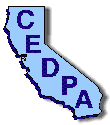
 |
California Educational Data Processing Association |
The DataBus - Vol. 37, No. 5
|
Dan Shahbazi, Internet Products Inc.
With last month's Supreme Court decision to strike down the Communication Decency Act provision that would have banned indecent material on the Internet, the education community may face new technology challenges in enforcing Internet acceptable use policies.
Although a slew of client based Web filtering packages continue to surface in an attempt to solve this challenge, these approaches, according to Farley Stewart, president of Internet Products, Inc., often present more of a management nightmare than a solution. An alternative is the deployment of a network filtering server which provides a single, centralized way of controlling Internet access instead of managing block lists at every client workstation.
Filtering servers fit well as a management solution because they use the standard proxy controls built into client Web browsers to channel all Web access through a central point. The central point, or Internet server, facilitates decisions regarding which sites to allow or block. Web filtering management is simplified because no software is installed on client workstations.
Internet Products is responding to these new filtering challenges with the release of an integrated Web filtering server onboard its flagship product InterGate. The filtering server is designed for seamless integration with the caching proxy and user management functions that InterGate currently provides.
Web filtering is coupled with twelve other Internet services that Stewart says effectively service and manage an Internet connection. quot;The addition of a Web filtering server will boost the performance of an already powerful solution,quot; Stewart noted.
He added that the integration of Web filtering with caching proxy services gives administrators complete control over which users can and cannot download particular sites. quot;Administrators will setup categories of users that have different Internet access profiles,quot; Stewart said. In addition, a network administrator may add or delete sites on InterGate's automatically updated block list at their discretion.
quot;What we're developing is a versatile tool that adds substantial value to the caching proxy features of InterGate,quot; Stewart added. quot;Not only is it essential for educators to block inappropriate Web material, it is prudent for them to monitor where users are going on the Net.quot;
Part of InterGate's caching proxy feature offers a logging mechanism that automatically records every URL any user accesses. These logs can be compiled to reveal a track record of Internet usage for any user at the organization. quot;Although the goal of InterGate Web filtering is to block sites rated as objectionable, it is still useful to have an audit trail of where users have been,quot; Stewart contended.
Internet Products is slated to release an integrated Web filtering server for the InterGate Solution in August and a subscription Web filtering service in the Fall. The new feature will increase InterGate's caching and filtering performance by ten times. This will substantially increase the number of users that can simultaneously access the Internet. Subscribers of InterGate Web filtering services will receive continuous and automatic updates to an extensive block list.
According to Stewart, InterGate is uniquely suited for educational Internet management because it defrays the cost and time involved in managing large numbers of users with differing Internet needs. quot;The evolution of InterGate continues to reach new milestones as a single high performance solution that provides all the Internet functions that even the largest districts can implement with the flick of a switch."
For further information about caching proxy services, Web filtering and the InterGate Solution visit Internet Products Web site at .